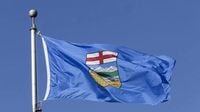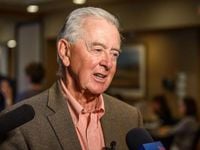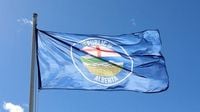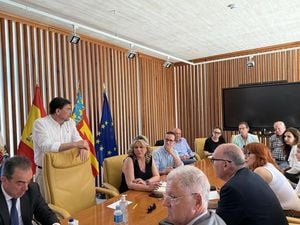In the wake of the recent federal election results, Alberta Premier Danielle Smith has publicly expressed her discontent with the newly elected Liberal government led by Prime Minister Mark Carney. In a statement issued on April 29, 2025, Smith criticized the Liberal victory, asserting that many Albertans are frustrated with the return of a government she claims has historically attacked the province's economy.
Smith, the leader of the United Conservative Party (UCP), congratulated Carney on his "minority government election victory" but emphasized her concerns regarding the implications for Alberta. She stated, "A large majority of Albertans are deeply frustrated that the same government that overtly attacked our provincial economy almost unabated for the past 10 years has been returned to government." This sentiment reflects a broader dissatisfaction among conservative voters in Alberta, where the Conservative Party is projected to win nearly all of the province's 37 ridings, with exceptions in Edmonton and Calgary.
In her statement, Smith invited Carney to work collaboratively with Alberta's government to reset the relationship between Ottawa and the province. "I invite the prime minister to immediately commence working with our government to reset the relationship between Ottawa and Alberta with meaningful action rather than hollow rhetoric," she said. The UCP plans to hold a special caucus meeting on May 2, 2025, to discuss the next steps regarding their approach to the federal government.
Smith's remarks come amid rising tensions between Alberta and Ottawa, particularly regarding energy policies. She has been a vocal critic of the federal government's environmental regulations, which she argues have limited Alberta's ability to exploit its natural resources effectively. Smith's demands from Carney include ensuring cross-country access for pipeline construction, eliminating the proposed greenhouse gas emissions cap, and repealing Bill C-69, which governs environmental assessments.
Smith's concerns resonate with many in Alberta, where a recent Angus Reid poll indicated that one in four Albertans would support the idea of the province becoming a sovereign nation outside of Canada. LaVar Payne, a former Conservative MP from Medicine Hat, described the Liberal win as "devastating" for Alberta, suggesting it could bolster the independence movement.
Payne's comments reflect a growing sentiment among some Albertans who feel increasingly alienated from the federal government. He stated, "This is going to be terrible for Canada and good chances it could be the end of Canada as we know it." This perspective is echoed by Preston Manning, a prominent political figure in western Canada, who warned that the election of another Liberal government could exacerbate feelings of estrangement in the region.
Manning has proposed the formation of a "Canada West Assembly" to explore various options for western Canada’s future, including potential independence-oriented proposals. He is currently conducting polling to gauge public sentiment regarding the Liberal government's impact on western alienation.
In her statement, Smith acknowledged that some Albertans are eager for independence but clarified that she does not advocate for separation from Canada. "I think Albertans share my view that we want to have Alberta sovereignty within a united Canada," she said. However, she emphasized the need for Ottawa to respect Alberta's constitutional rights and facilitate resource development rather than obstruct it.
Smith's frustration with the federal government is not new. She has consistently criticized previous Liberal administrations, particularly under Justin Trudeau, for policies she believes have harmed Alberta's economy. In her view, the recent election results signify a continued disregard for the concerns of Albertans.
The political landscape in Alberta is shifting, with the UCP's recent electoral success positioning them as a formidable voice against the federal government. Smith's government is expected to take a hardline stance on federal policies that they perceive as detrimental to Alberta's interests. As she prepares for the upcoming caucus meeting, Smith is determined to engage Albertans in discussions about their province's future and potential strategies for ensuring its prosperity within Canada.
In his victory speech, Carney acknowledged the challenges of governing in Alberta and Saskatchewan, regions that have historically leaned conservative. He expressed his commitment to representing all Canadians, stating, "My message to every Canadian is this. No matter where you live, no matter what language you speak, no matter how you voted, I will always do my best to represent everyone who calls Canada home."
While Carney's administration has promised to work with the oil and gas industry and expedite resource project approvals, skepticism remains among Alberta’s leaders. Smith has indicated that whether relations can be mended depends on Carney's willingness to address legislation perceived as offensive to Albertans.
Political analysts suggest that Smith's assertive stance may not align with the broader mood of unity emerging in Canadian politics. Brendan Boyd, a political science professor, noted that Smith's defiance is becoming an outlier as other leaders focus on national cohesion in the face of challenges such as U.S. tariffs.
As Alberta navigates its relationship with the federal government, the upcoming weeks will be critical in determining the province's path forward. Smith's UCP government is poised to lead discussions on Alberta's future, with the potential for significant implications for the province's autonomy and its role within Canada.
In conclusion, the recent federal election results have intensified conversations about Alberta's political identity and its relationship with Ottawa. With rising support for independence and a government willing to challenge federal policies, Alberta's future remains uncertain as both sides prepare for a potentially contentious relationship.






